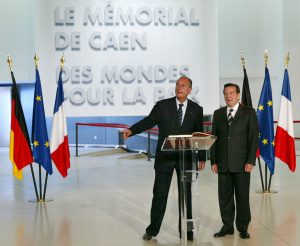Address by Gerhard Schröder
German Chancellor
60th Anniversary of the Normandy Landings – Official Speeches

Speech delivered on Sunday, 6 June 2004, at the Franco-German ceremony at the Caen Memorial
“Mr. President of the Republic,
Mr. Prime Minister,
Ladies and Gentlemen,
Dear fellow Europeans,
Sixty years ago today, Caen and Normandy were the scene of immeasurable suffering, and tens of thousands of victims littered this land, the same land on which valiant soldiers displayed their courage to liberate Europe.
France’s memory of June 6, 1944, is different from Germany’s, and yet this memory has aroused the same feeling in both: we are convinced that we want peace. We Germans know who the criminal perpetrators of the war were. We are aware of our responsibility before history, and we accept it. Thousands of Allied soldiers died in a single day, a day of horror. They paid with their lives for freedom.
German soldiers died because they had been drawn into a murderous campaign to enslave Europe.
But in their death, all these soldiers were united beyond the camps to which they belonged, united in mourning for their parents and wives, their brothers and sisters, and their friends. We bow before the pain that oppresses them all.
I recall the memory of the inhabitants of Oradour who, sixty years ago, fell victim to the unleashed SS troops and their brutality.
The memory of June 6, 1944, held by France and its allies, as well as by the inhabitants of the city of Caen, which suffered so much, is different from that held by most Germans. For France, this historic day marked the end of the occupation it had awaited for so long.
For many Germans, June 6 symbolized definitive military failure.
Others had long understood that Nazi tyranny heralded Germany’s moral collapse.
Many of them had to pay with their lives in concentration camps for opposing the reign of terror.
Faced with the rapid advance of the Allied troops, the German resistance attempted a final blow against the dictatorship on July 20, 1944; This attempt failed, and they died for a better Germany.
The military cemeteries and scars of the two world wars impose a constant duty on all European peoples, and particularly on the German people: the duty to oppose racism, anti-Semitism, and totalitarian ideologies. The democratic goals to which we aspire are freedom, justice, and a dignified life for all, in peace, without religious hatred, national arrogance, or political blindness.
In achieving these goals, we have as assets the heritage of the Enlightenment, tolerance, and the comforting beauty of European culture.
Preserving these goals has been and remains the mission dictated to us on June 6, 1944.
Europe has learned the lessons of the past, and I want to say that we Germans accept them in all their reality. It is the responsibility of European citizens and their political leaders to do everything possible to prevent wars, war crimes, and terrorism from flaring up elsewhere.
Ladies and gentlemen, the overthrow of the Hitler dictatorship was the work of the Allies in the West and the East. Nor will we forget the millions of victims of the Nazis in Eastern Europe, nor the women and men of the Western Alliance countries, nor the Russian soldiers who gave their lives for the liberation of their homeland. No one will ever forget the horrific history of Hitler’s 12-year dictatorship.
My generation grew up in its shadow. It was only four years ago that my family found the grave of my father, a soldier who died in Romania. I never knew him.
Ladies and gentlemen, I am not representing the old Germany of those dark years here today. My country has regained its place within the community of civilized peoples. Building a prosperous and stable democracy took a long time. In 1989, the citizens of East Germany succeeded, in a peaceful revolution, in overthrowing the communist dictatorship, establishing freedom and achieving unity. But if we were able to successfully reunify our country, it is also thanks to France, which extended a helping hand to us, demonstrating generosity and political wisdom.
This day of June 6, 2004, offers us a good opportunity to thank France and its allies. Overthrowing Hitler’s dictatorship took patriots and soldiers. It is precisely because we Germans know this that we are not pacifists. But neither do we want to use military means lightly. However, in cases where military intervention has been and remains necessary, Germany does not shy away from its responsibility to defend peace and human rights.
Ladies and gentlemen, the sight of the European battlefields arouses deep sadness in us. This feeling only strengthens our gratitude that France and Germany have never been closer to each other than today. Nationalist madness has been transformed into a European partnership.
I appeal to you to use this day of remembrance to advance our work for peace. We want to create a united and liberal Europe that fully assumes its responsibility for peace and justice on our continent and throughout the world. This is our hope. Franco-German friendship was also born under the sign of hope. Today, it is characterized by trust and reliability. What seemed impossible on June 6, 1944, came true because the men and women of our countries wanted it that way.
I would like to cite the example of German soldier Hans Flindt, originally from Usedom. He fought in Normandy, where he was taken prisoner. After his liberation, he married a French woman and remained in France. This 78-year-old man recalls June 6, 1944, saying: “For all of us, it was the beginning of a new life, a happier life.”
Those who were not fortunate enough to experience this happier life sixty years ago deserve our continued memory with a sense of deep respect.
They did not die in vain, for today we live in freedom and peace, and for that we are grateful.
We promise that we will never forget the victims!”
![]() Back to D-Day 2004 Commemorations Speeches menu
Back to D-Day 2004 Commemorations Speeches menu
